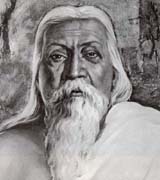 |
 |
| Aravinda Ackroyd Ghosh |
 |
| Aravinda Ackroyd Ghosh was
born on August 15, 1872, in Calcutta. His father, Dr. Krishnadhan Ghosh,
a civil medical officer in Bengal, added the middle name Ackroyd because
a Miss Ackroyd, a visitor from England, was present at his birth. His mother,
Swarnalata Devi, was the daughter of nationalist Rajnarayan Bose. Aravinda's
father attained his M.D. from the University of Aberdeen in England. By
the time Krishnadhan returned to India, he was so westernized that he vowed
to bring his children up as Englishmen
Aravinda and his brothers were admitted to a special school in Darjeeling, in 1877, which was meant only for English children. For two years the boys were taught by Irish nuns of the Loretto Convent School. In 1879, the children were taken to England. The two elder boys were admitted to a school, while Aravinda, who was just seven years old, was left in the care of Rev. W. H. Drewett and his wife in Manchester. The Drewetts were to tutor Aravinda. Aravinda learned English and Latin from the Reverend, and history, geography, arithmetic and French from Mrs. Drewett. Aravinda became fond of reading and made full use of the personal library of the Drewetts. After five years of comfortable living in Manchester, when the boys moved to London, their remittances from Dr. Ghosh started dwindling. |
|
He was only 21 and did not even possess proper qualifications. He accepted a post promised by Sayaji Rao Gaekwad of Baroda when he was in England, with a fixed salary of Rs. 200. He was first appointed in the survey settlement department, and later in the department of stamp and revenue. Often he served as the Gaekwad's personal secretary and prepared the Gaekwad's speeches and wrote the communiques between Baroda State and the Indian Government. In 1900, Aravinda accepted the post of professor of English at Baroda College and also taught French as a part-time professor. Aravinda married Mrinalini, daughter of Bhupal Chandra Basu, in 1901. Aravinda was 29 years old at the time of marriage while Mrinalini was only 14. The two had very little time to spend with each other since Aravinda lived in Baroda, and Mrinalini remained in Calcutta. Aravinda deeply loved his wife and was always regular in writing letters to her. His letters to her were published as a book called "Letters to Mrinalini." Mrinalini was initiated by Ma Sarada, saintly wife of Sri Ramakrishna Paramahamsa of Dakshineshwara, seeking spiritual refuge. Mrinalini died of influenza in 1918 in Calcutta at the age of 31. In one of his letters to Mrinalini, Aravinda mentioned his three beliefs. First, he believed that whatever he had: talent, virtue, high education-all belonged to God. Second, he wished to come face to face with God. Third, in his own words, "Others look upon India , their country, as a mass of matter, a number of fields, plains, forests, mountains, and rivers and nothing more." He believed his nation to be his own mother. He adored her and worshipped her. He saw the entire nation at his door, seeking shelter and help in attaining freedom from foreign shackles. Initially, Aravinda's political activities were limited to Baroda, but they soon extended to Maharashtra, Gujarat and Bengal. He learned Marathi and Gujarati and taught himself Sanskrit. He studied Bengali under litterateur Dinendra Kumar Roy. Ghosh's goal was to capture the public through writing. He made an extensive study of Indian literature and papers on the Indian freedom struggle. Armed with fluency in Marathi, Gujarati and Bengali, he then transcribed his views in papers like the Indu Prakash, Bande Mataram, Dharma, and Karma Yogin. His writing became the ideal for the Indian youth. He called on the young to serve the nation as "karmayogins." He wanted the youth to devote all their energies toward freeing Mother India. He told the youth that, "if you will study, study for her sake; train yourself body and mind and soul for her service; work so that she may prosper; suffer so that she may rejoice." Ghosh formed secret revolutionary societies which enveloped Bengal. He asked members of these secret societies to take a solemn oath to "secure the freedom of Mother India at any cost." He stoked the fire of revolution by organizing a huge rally on November 9, 1905, in Calcutta. In the meantime, the Bande Mataram, a paper Ghosh edited, won the praise and admiration of all. The British, in an effort to curb the growing dissent, prosecuted the Bande Mataram and arrested Ghosh, who was charged with propagating sedition. The British resorted to caning anyone chanting "Bande Mataram". Aravinda was acquitted for lack of proof. |
|
|
|
On his release from jail, Ghosh came out a changed man. He seemed confident that India would attain her freedom. He now decided to devote his life to the liberation of the whole of the human race. On the advice of some friends, like Sister Nivedita, disciple of Swami Vivekananda, Ghosh left British India and moved to French Pondicherry on April 4, 1910 to avoid confrontation with the British. Ghosh came to be known as Sri Aurobindo to the world. Aurobindo completed his "Savitri", which he began writing in 1899 and published in 1954. Savitri represented, in Sri Aurobindo's own words "a means of ascension. I begin with it on a certain mental level, each time I could reach a higher level I rewrote from that level... ." He wrote in the "Savitri": |
|
the mortal's world. On nature's luminous tops, On the spirits ground, The Superman shall reign as a King of life, Make earth almost the mate and peer of heaven." Savitri |
|
Sri Aurobindo was a master of Yoga which he believed would develop the "higher principles of life" which remain hidden within every individual. He felt humanity could attain perfection little by little through conscious preparation and effort. On Independence Day, Sri Aurobindo's message to the nation was, "August 15, 1947 is the birthday of free India. It marks for her the end of an old era, the beginning of a new age. But we can also make it by our life and acts as a free nation, an important date in a new age opening for the whole world, for the political, social, cultural and spiritual future of humanity." Sri Aurobindo died on December 5, 1950 in Pondicherry. |
| Back to Home |
|
||||
 |
 |
 |
 |
 |